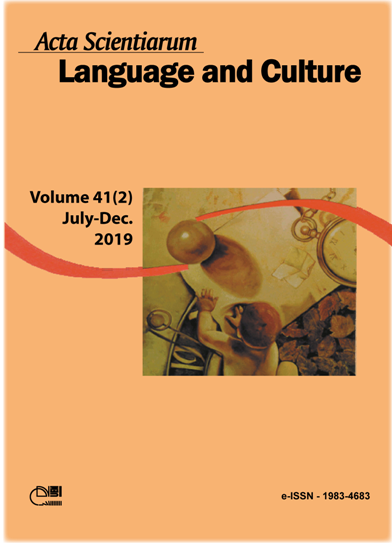Idyllic Self in Africa (2000), by Ken Taylor and in Boy (2010), by Taika Waititi: a literary-cinematographic dialogue
Resumen
The idyllic approach of this article deals with the dialogue between two distinct artworks: poems from the book Africa (Taylor, 2000), emphasizing the poem ‘Waikiki’, by the Australian poet, journalist and filmmaker Ken Taylor; and the movie Boy (Curtis, Gardiner, & Michael, 2010), directed by the New Zealander film-director, actor and writer Taika Waititi. The poems and the movie are connected by synesthetic perceptions, mostly related to painting, colorizing and shaping that are displayed in the described scenarios. Hereby, these aspects were theoretically reviewed by the following authors: Rimbaud (1966), Kandinsky (1977), Ostrower (1977), Bachelard (1986, 2011), Cytowic (1993), Berger (2008), Lambert (2010), among others. The method of analysis includes the concepts in which the art producers uncovers the relationship between nature and the self, considering the fact that beyond poet and director, respectively Taylor and Waititi are also painters. Nature is widely open before their meditative eyes, therefore rather than outreaching the natural world with motionless expectations; both portray idyllic wonders related to individual/cultural scopes. As a result, from its amorphous state, words transmute themselves into landscapes, sensations, and forms. The aim was to follow the paths that image evocates in the description of each author, since they share contemplativeness, surrounded by consciousness, perceptions and freedom, all demanded during the creative process.
Descargas
DECLARAÇÃO DE ORIGINALIDADE E DIREITOS AUTORAIS
Declaro que o presente artigo é original, não tendo sido submetido à publicação em qualquer outro periódico nacional ou internacional, quer seja em parte ou em sua totalidade.
Os direitos autorais pertencem exclusivamente aos autores. Os direitos de licenciamento utilizados pelo periódico é a licença Creative Commons Attribution 4.0 (CC BY 4.0): são permitidos o acompartilhamento (cópia e distribuição do material em qualqer meio ou formato) e adaptação (remix, transformação e criação de material a partir do conteúdo assim licenciado para quaisquer fins, inclusive comerciais.
Recomenda-se a leitura desse link para maiores informações sobre o tema: fornecimento de créditos e referências de forma correta, entre outros detalhes cruciais para uso adequado do material licenciado.




















6.png)









